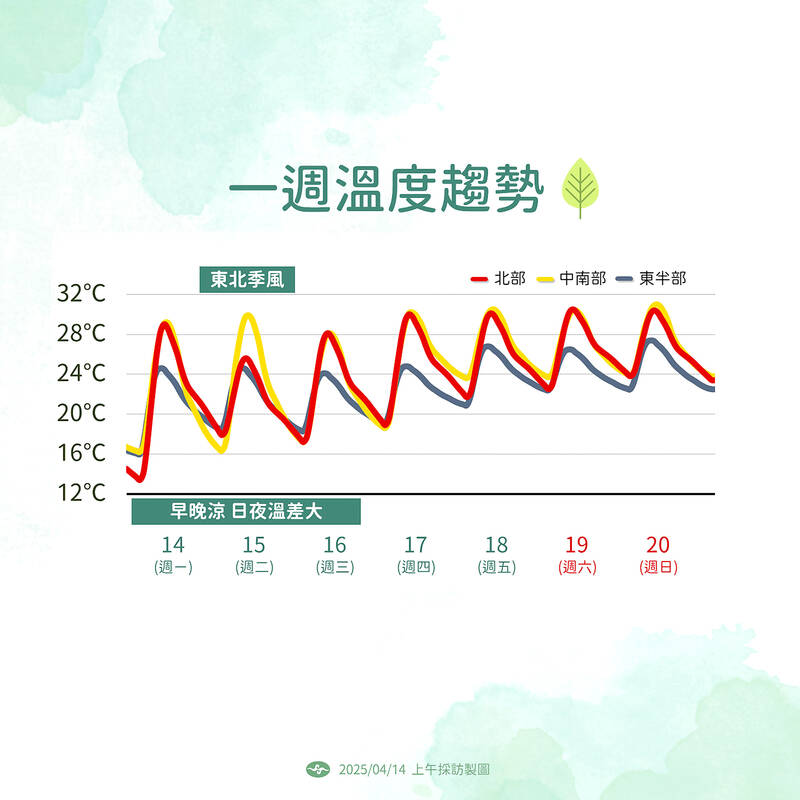The risk of stroke is doubled when a sudden day-to-day temperature increase goes over 6°C or a decrease exceeds 14°C, the risk of triggering a stroke is doubled, a research team at the National Health Research Institute (NHRI) said yesterday.
Extreme weather events are becoming more frequent and intense around the world, and the World Meteorological Organization said that last year was the warmest year on record, the research team said.
A 2012 Global Burden of Disease study showed that stroke was the second most common cause of death worldwide and that ambient temperature was a risk factor for stroke, they said.

Photo provided by the Central Weather Administration
NHRI Institute of Environmental Health Sciences assistant researcher Wu Wei-te (吳威德) said that climate could affect cardiovascular health, but the impact of temperature fluctuations on stroke risk remained underexplored, so the team aimed to find links between sudden day-to-day temperature changes and stroke onset in Taiwan, with air pollutants also taken into consideration.
The team said it used temperature records and data on about 1.1 million first-time stroke emergency events between 2001 and 2020 to examine the connection between temperature changes and stroke risk, including total stroke, ischemic stroke and hemorrhagic stroke.
Wu said they found that when the rise in day-to-day temperature exceeded 6°C, the risk of ischemic stroke more than doubled, and a day-to-day fall exceeding 14°C doubled the risk of hemorrhagic stroke.
Moreover, a temperature exceeding 35°C was associated with an increased likelihood for stroke-related emergency department visits, primarily ischemic stroke, while temperatures below 16°C was strongly associated with a doubled risk of hemorrhagic stroke, he said.
The link between hot weather and ischemic stroke is likely because high temperatures could lead to dehydration, and subsequently to thicker blood and increased risk of blood clots, which can block arteries, Wu said.
Meanwhile, low ambient temperatures can activate the sympathetic nervous system, leading to the narrowing of blood vessels and increased blood pressure, he added.
Wu said the team’s findings indicate that sudden day-to-day temperature increases and decreases can be significant predictors of stroke onset.
If the weather and health risk warning mechanisms could be integrated into public health policy, especially during seasonal changes or extreme weather events, it might help elderly people or people who have a high risk of stoke to take preventive measures, he said, adding that it could reduce the impact of sudden temperature changes on people’s health.
The study is to be published in the international journal The Lancet Regional Health — Western Pacific this month.

Taiwan is stepping up plans to create self-sufficient supply chains for combat drones and increase foreign orders from the US to counter China’s numerical superiority, a defense official said on Saturday. Commenting on condition of anonymity, the official said the nation’s armed forces are in agreement with US Admiral Samuel Paparo’s assessment that Taiwan’s military must be prepared to turn the nation’s waters into a “hellscape” for the Chinese People’s Liberation Army (PLA). Paparo, the commander of the US Indo-Pacific Command, reiterated the concept during a Congressional hearing in Washington on Wednesday. He first coined the term in a security conference last

A magnitude 4.3 earthquake struck eastern Taiwan's Hualien County at 8:31am today, according to the Central Weather Administration (CWA). The epicenter of the temblor was located in Hualien County, about 70.3 kilometers south southwest of Hualien County Hall, at a depth of 23.2km, according to the administration. There were no immediate reports of damage resulting from the quake. The earthquake's intensity, which gauges the actual effect of a temblor, was highest in Taitung County, where it measured 3 on Taiwan's 7-tier intensity scale. The quake also measured an intensity of 2 in Hualien and Nantou counties, the CWA said.

The Overseas Community Affairs Council (OCAC) yesterday announced a fundraising campaign to support survivors of the magnitude 7.7 earthquake that struck Myanmar on March 28, with two prayer events scheduled in Taipei and Taichung later this week. “While initial rescue operations have concluded [in Myanmar], many survivors are now facing increasingly difficult living conditions,” OCAC Minister Hsu Chia-ching (徐佳青) told a news conference in Taipei. The fundraising campaign, which runs through May 31, is focused on supporting the reconstruction of damaged overseas compatriot schools, assisting students from Myanmar in Taiwan, and providing essential items, such as drinking water, food and medical supplies,

New Party Deputy Secretary-General You Chih-pin (游智彬) this morning went to the National Immigration Agency (NIA) to “turn himself in” after being notified that he had failed to provide proof of having renounced his Chinese household registration. He was one of more than 10,000 naturalized Taiwanese citizens from China who were informed by the NIA that their Taiwanese citizenship might be revoked if they fail to provide the proof in three months, people familiar with the matter said. You said he has proof that he had renounced his Chinese household registration and demanded the NIA provide proof that he still had Chinese